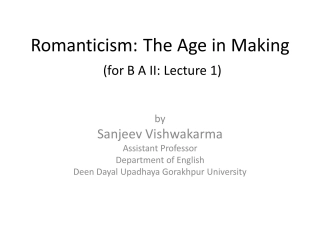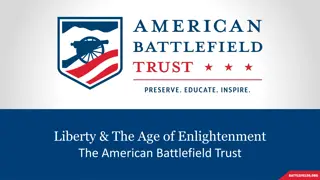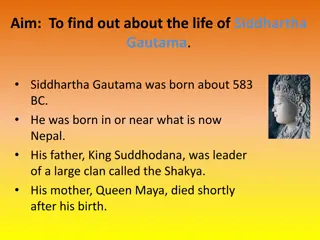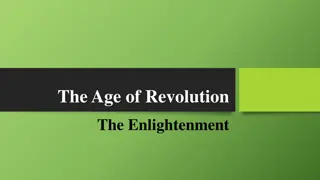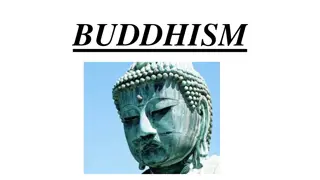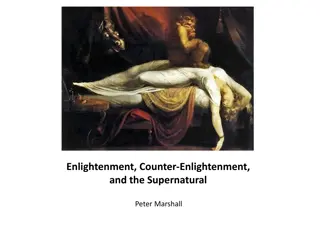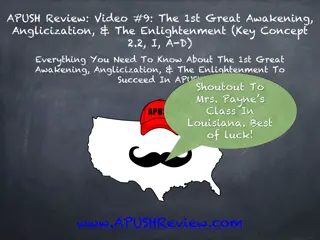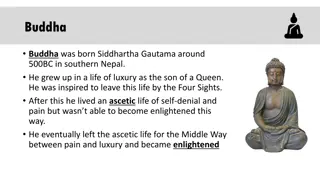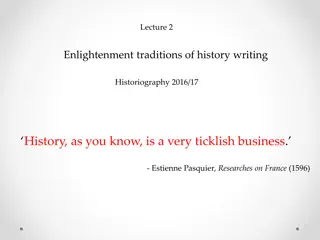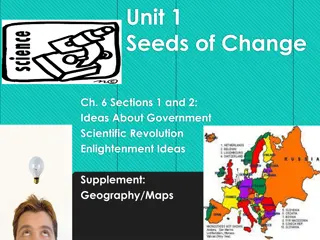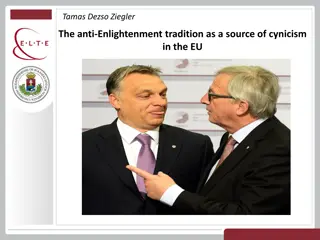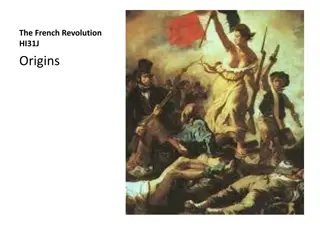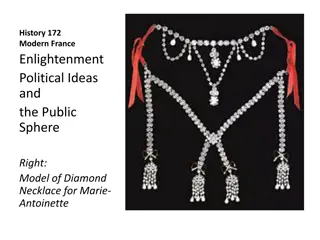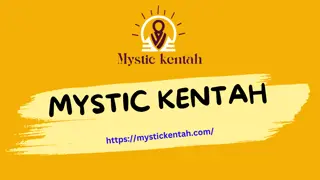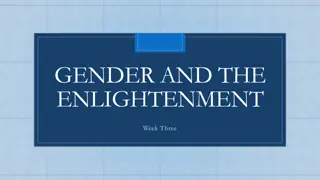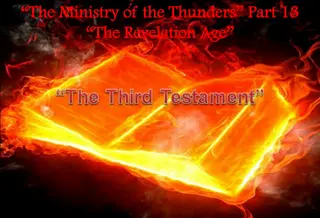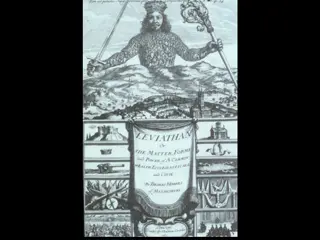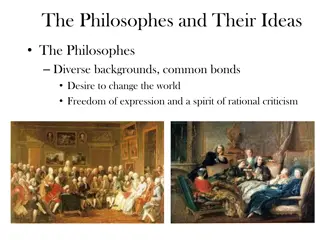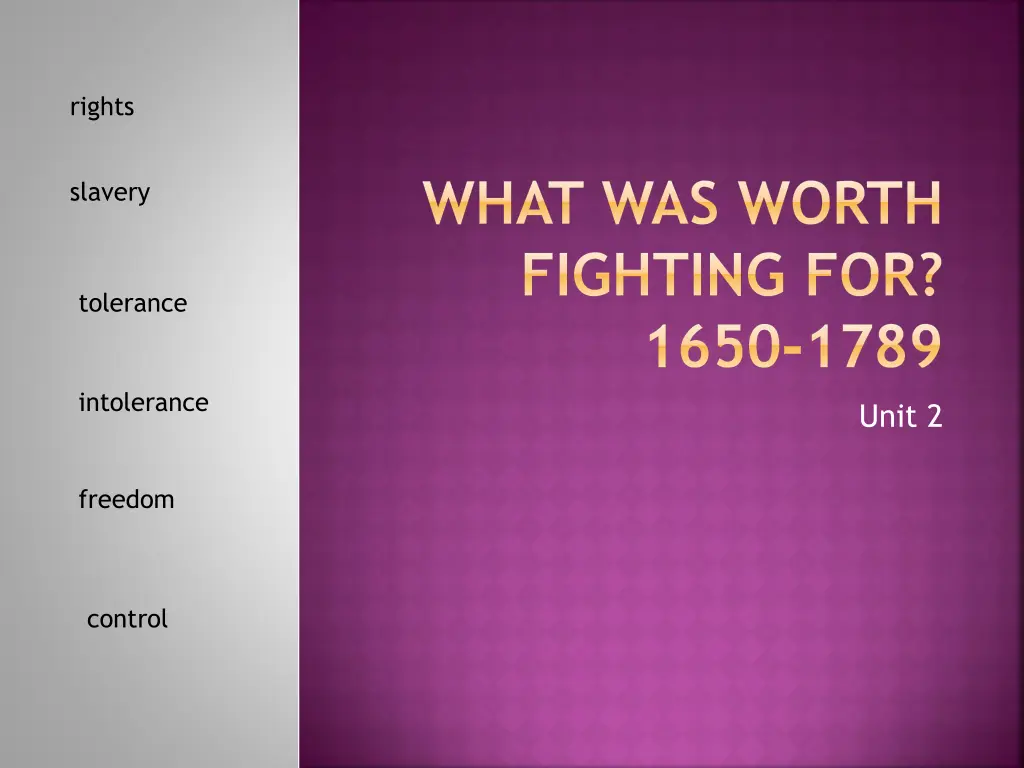
Enlightenment and Human Rights Exploration
Explore the complex aspects of human rights during the Enlightenment period, including the paradox of freedom coexisting with slavery and intolerance. Delve into the enlightened characteristics, social contracts, political systems of the time, and the views of influential figures like Locke and the philosophes. Uncover the challenges and philosophical debates that shaped the era.
Download Presentation

Please find below an Image/Link to download the presentation.
The content on the website is provided AS IS for your information and personal use only. It may not be sold, licensed, or shared on other websites without obtaining consent from the author. If you encounter any issues during the download, it is possible that the publisher has removed the file from their server.
You are allowed to download the files provided on this website for personal or commercial use, subject to the condition that they are used lawfully. All files are the property of their respective owners.
The content on the website is provided AS IS for your information and personal use only. It may not be sold, licensed, or shared on other websites without obtaining consent from the author.
E N D
Presentation Transcript
rights WHAT WAS WORTH FIGHTING FOR? 1650-1789 slavery tolerance intolerance Unit 2 freedom control
THE ENLIGHTENMENT [?] CHY4U
JEAN CALAS According to the story, what was worth fighting for? Broken on the wheel, 1762
ENLIGHTENED CHARACTERISTICS Reason over tradition Rational optimism Freedom of thought over obedience to tradition Rights Tolerance Individualism Social criticism
ALL GOOD? NO, VERY COMPLEX At its heart, the movement contained a paradox: Ideas of human freedom and individual rights took root in nations that held other human beings in bondage and were then in the process of exterminating native populations. Colonial domination and expropriation marched hand in hand with the spread of liberty, and liberalism arose alongside our modern notions of race and racism. Jamelle Bouie, The Enlightenment s Dark Side: How the Enlightenment created modern race thinking, and why we should confront it , Slate, June 5, 2018, https://slate.com/news-and- politics/2018/06/taking-the-enlightenment-seriously-requires-talking-about-race.html
LOCKE life, liberty and property
SOCIAL CONTRACT Locke s 2-way contract The people form a contract with ________. The ruler forms a contract with _________. 1. 2.
LOCKE TAKEUP __________ on authority __________ liberties __________ rights = LLP Contract = ________________ State of __________________ Right to __________________
POLITICAL SYSTEMS constitutional monarchy absolute monarchy Like England Like France In the 1600s and 1700s neither was a democracy in which ordinary people could actually vote.
PHILOSOPHES Diderot
INTOLERANCE IS BLASPHEMOUS whoever is intolerant in this sense is an evil man, a bad Christian, a dangerous subject, a poor statesman, and a bad citizen. teaching, persuasion, and prayer, these are the only legitimate means of spreading the faith. Conscience must be enlightened, not constrained. It will take only three or four intolerant men to tear apart the entire fabric of society.
SUGGESTED TEXTBOOK READING pages 146-150: Philosophes Bayle Diderot Voltaire Turgot Hogarth Rousseau page 83 : Locke
MATCH Name Bayle Detail A Attack privilege and question tradition B Genius is the key to progress and it s only available in rational societies C Passion and nature; society corrupts D Find evidence rather than accept things at face value E Satirist of English corruption and greed F Preferred English form of Diderot Voltaire Turgot Rousseau Hogarth
ROUSSEAU WAS DIFFERENT Philosophes Progress Rousseau man was born free, and everywhere he is in chains. State of nature preferred: our minds have been corrupted in proportion as our arts and sciences have made advances toward their perfection. Lifelong theme: innocence vs. experience Salons Individualism /scared of democracy Critical of salons Community (general will) dirty d?

